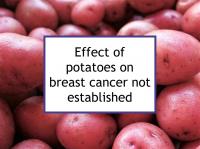By "potatoes" we mean white potatoes (Solanum tuberosum) — sweet potatoes are covered separately. Potatoes are a dietary source of alpha-lipoic acid, vitamin C and vitamin B6. Red-skinned potatoes also contain the chemopreventive compounds caffeic acid, catechin, gallic acid, and chlorogenic acid, as well as α-chaconine and α-solanine. Potato skin is more nutritious than the flesh.
Consuming whole cooked potatoes with the peel has been shown to improve the cholesterol profile of laboratory rats.
Potato has been shown to suppress proliferation and induce apoptosis of human lymphoma, liver, stomach, cervical, colon, and prostate cancer cells. One study found that overall mortality in older Dutch women was lower for women following a "healthy" modified traditional Dutch diet: the traditional diet was made healthier by reducing alcohol and meat consumption and increasing vegetable intake without eliminating potatoes (however note that most of the potatoes were boiled or steamed, rather than fried). Potato consumption has been found to be associated with increased risks of oral and rectal cancer. Pan fried and French fried potatoes have also been found to be associated with higher risks of oral, laryngeal and esophageal cancers.
Breast cancer-related effects of eating potatoes
Potato has been shown to suppress proliferation of mouse mammary tumor cells. Fried potatoes were found in one study to be associated with increased risk of estrogen receptor negative (ER-) breast cancer.
Various "meat and potatoes" dietary patterns have been found to be associated with increased risks of many cancer types, including breast cancer. However, it is possible that these heightened risks may be due primarily to red meat and fried potato intake; it is possible that consumption of boiled or steamed potatoes does not carry such risks.
French fries prepared in fast food restaurants typically are deep fried in soybean oil or a soybean oil mixture is repeatedly reheated to relatively high temperatures (typically 330 to 360 degrees Fahrenheit) and used for many hours over a period of days (although normally it is filtered daily to remove debris). This pattern of use causes "thermal abuse" of frying oil, resulting in chemical changes that appear to promote breast cancer. One study reported that mice fed soybean oil deteriorated by repeated reheating had a sharply higher frequency of metastatic tumor formation than mice fed fresh soybean oil in an animal model of late-stage breast cancer.
Additional comments
Potatoes with red skins incorporate anthocyanins that are know to be provide some protection against breast cancer risk. We would suggest buying organic red-skinned potatoes and eating them (along with their skins) after steaming or boiling them.
Potatoes typically are grown using significant levels of pesticides and typically are also a dietary source of cadmium. Pesticides normally are present in potatoes whether purchased raw or in precooked forms such as hash browns or French fries. Studies have found increased mortality from hormone-dependent cancers in traditional potato-growing areas, presumably from potato pesticide exposure. Peeling potatoes reduces but does not eliminate pesticide exposure from the cooked food and it eliminates the vitamin D and other beneficial nutrients found primarily in the skin.
Fried potatoes, especially potato chips and French fries, contain acrylamide, a suspected carcinogen. Acrylamide is produced by subjecting potatoes to high heat or charring them. Generally speaking, acrylamide intake within the range of U.S. diets has not been found to be associated with increased risk of breast cancer. However, a 2021 meta-analysis of data from 18 previous studies found that high acrylamide intake was associated with increased breast cancer risk among premenopausal (but not postmenopausal) women. In addition, a 2024 study reported that DNA damage caused by acrylamide exposure is exacerbated by obesity in a mouse model of breast cancer.
The toxic potato compounds alpha-chaconine and alpha-solanine both have been found to damage the liver. They are concentrated in potato sprouts, which should not be eaten. Medicinal potato extracts containing these compounds are also to be avoided.
Sources of information provided in this webpage
The information above, which is updated continually as new research becomes available, has been developed based solely on the results of academic studies. Clicking on any of the underlined terms will take you to its tag or webpage, which contain more extensive information.
Note that while we are continually searching for new evidence specifically concerning potatoes, there is not much interest in it among cancer researchers so few recent studies are available.
